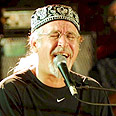
Artists to receive Religious Tolerance award
Schechter Institute of Jewish Studies awarding Marc and Henia Liebhaber Prize for the Promotion of Religious Tolerance and Cultural Pluralism to Jacky Levy, Shlomo Gronich. 'The fact of the prize indicates that those who practice tolerance are the few against the many. I am pleased yet somewhat ashamed to receive this award,' says Levy
This Hannukah, the Schechter Institute of Jewish Studies is awarding the Marc and Henia Liebhaber Prize for the Promotion of Religious Tolerance and Cultural Pluralism to Jacky Levy and Shlomo Gronich for their important contribution to this cause.
The NIS 100,000 prize, to be divided between the two, was instituted after the Rabin assassination, and is awarded yearly to individuals.
“Religious tolerance is supposedly part of our Jewish tradition,” Levy says. “The fact of the prize indicates that those who practice tolerance are the few against the many. I am pleased yet somewhat ashamed to receive this award; it makes me think, why is it not the other way around? People who exhibit intolerance should be punished.”
Gronich perceives a similar reality: “Intolerance is a worldwide occurrence, but in our country we are not graced with a large measure of tolerance. We see it daily, in relation to foreign workers, Ethiopians, and haredim.”
The Schechter Institute said, "Intolerance, being so widespread, is present in the religious sector as well. Religious people claim that they are victims of intolerance, while others accuse them of being intolerant themselves."
According to Levy, "there are religious and non-religious people who believe that being religious is the opposite of tolerance.
"Perhaps this is so because God is seen as absolute and some believe this to mean that they must be God’s policeman, and reprimand anyone seen to be in error. Others feel the enormity of the distance between themselves and the absolute Being, and this fills them with humility and humor," he said.
"To me, to laugh at oneself and to be in awe of God are synonymous. The Torah (the giving of which I celebrated in second grade) says that God insisted that the firstborn of our nation’s father be named Yitzhak (he shall laugh). This isn’t by chance."
'Sometimes I want to scream'
Levy continued to say that "trying to point to an example of intolerance here is like trying to give an example of gravity working. As a Jerusalemite, I can give such examples any day of the week. Not long ago I was in the synagogue and someone who was called to the Torah asked for a blessing because it was his birthday. After the aliyah, a few people sang ‘Happy Birthday’ to him, and immediately there was loud protest, as if the song is against our values and profanes the house of prayer.
"All these cases send a simple message – don’t encourage Bet Shammai, who will always be here; Bet Hillel, however, should be nurtured. Still, over the years there has been a change. Perhaps we have gotten old," he said.
According to Levy, the religious sector used to tend towards extremism and automatic negation of anything that lacked a hechsher from a rabbi: “It used to be, if you wanted publicity, you just had to annoy the religious and they took care of the publicity. Then a measure of restraint was introduced. I think that things that used to break up coalition governments are now tolerated. I see it when I am on stage. Even when I say something they don’t agree with, the audience listens. Today’s religious audience is surprisingly cool.”
When asked to explain this, Levy said that today, perhaps, the religious sector feels less threatened. In the past, religious people felt that any word against them could blot them out, eliciting extreme reactions. “New generations have arisen, with a new voice. Maybe they simply feel more at home, and perhaps understand better and better that no good can come of extremism.”
Gronich has worked for years on musical projects with Ethiopians and Russians, and with projects based on Jewish texts. “When I conduct these projects I am engaging in self-correction. The more people engage in self-expanding activities, which benefit society, the more we will see the light.
“We call ourselves a light unto the nations, but meanwhile this light is not visible. Bad education is responsible for intolerance being so pervasive. The country lacks proper education. Israel was built patch by patch without any long term planning; we had to survive the moment. We see the results of this today. Education here is underdeveloped. The cracks are in the foundations, and the challenge is to reach down and repair them," he said.
“Sometimes I want to scream at things that go on here, such as deporting the children of foreign workers. I feel at times that we are trying to distill Jewish blood, which is reminiscent of dark events in history. I have no doubt that in order to bring about change, education towards tolerance must begin at an early age. My words are harsh, making me sound pessimistic – but I’m not.”










